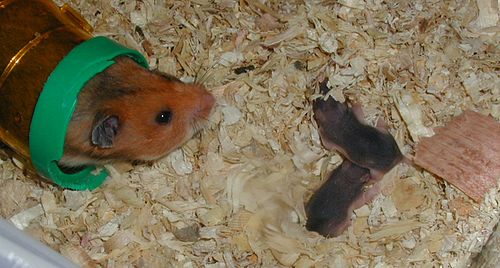Hamsternoun
Any of various Old-World rodent species belonging to the subfamily Cricetinae.
Hamsternoun
especially, the golden hamster, Mesocricetus auratus, and the dwarf hamsters of genus Phodopus, often kept as a pets and used in scientific research.
Hamsternoun
Other rodents of similar appearance, such as the maned hamster or crested hamster, Lophiomys imhausi, mouse-like hamsters of genus Calomyscus, and the white-tailed rat (Mystromys albicaudatus).
Hamsternoun
A small European rodent (Cricetus frumentarius). It is remarkable for having a pouch on each side of the jaw, under the skin, and for its migrations. Hamsters are commonly kept as a pets.
Hamsternoun
short-tailed Old World burrowing rodent with large cheek pouches
Hamster
Hamsters are rodents (order Rodentia) belonging to the subfamily Cricetinae, which contains 19 species classified in seven genera. They have become established as popular small pets.
Marmotnoun
Any of several large ground-dwelling rodents of the genera Marmota and Cynomys in the squirrel family.
Marmotnoun
Any rodent of the genus Marmota (formerly Arctomys) of the subfamily Sciurinae. The common European marmot (Marmota marmotta) is about the size of a rabbit, and inhabits the higher regions of the Alps and Pyrenees. The bobac is another European species. The common American species (Marmota monax) is the woodchuck (also called groundhog), but the name marmot is usually used only for the western variety.
Marmotnoun
Any one of several species of ground squirrels or gophers of the genus Spermophilus; also, the prairie dog.
Marmotnoun
stocky coarse-furred burrowing rodent with a short bushy tail found throughout the northern hemisphere; hibernates in winter
Marmot
Marmots are relatively large ground squirrels in the genus Marmota, with 15 species living in Asia, Europe, and North America. These herbivores are active during the summer when often found in groups, but are not seen during the winter when they hibernate underground.


























